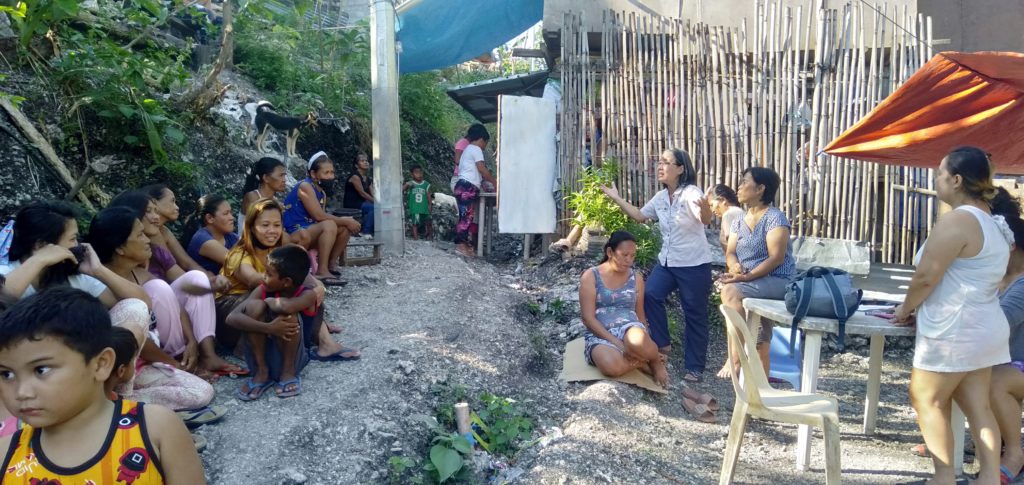November 2012 – November 2013
The Visayas Primary Health Care Services, Inc. successfully implemented an environmental health project with the support of the Foundation for Philippine Environment.
Barangays Tangke, one of the 22 barangays in Talisay City, Cebu, is one of the ten coastal barangays in Cebu affected by the South Reclamation Project (SRP). With the reclamation of more than 300 hectares of sea coast once teeming with a lush marine ecosystem that provided food and that served as a dock and fishing area, hundreds of fisherfolk families have suffered from the displacement of their livelihood and homes.
Spanning 90.06 hectares with a population of 11,791 or 1,636 households (NSO 2007), it has seven sitios, namely: Salvador, Kilawan, San Rafael, San Pedro, Magay, Galaxy, and Rattan.
More than 80 percent of the families in Tangke used to depend primarily on fishing as their main source of income. With the establishment of the SRP, the irregular weather pattern and advent of illegal commercial fishing which all reduced their fish catch, nearly half of the fishing community have suffered and have to resort to other odd jobs such as construction work, vending food stuff, trisikad driving, employment in small businesses, dried fish processing, which earn a meager income of about P 100 to P 250 a day. About ten percent are unemployed.
Environmental sanitation is very poor. The garbage truck of the city government collects garbage only once a week. Garbage which comes from neighboring communities and washed to shore litters the coastline. Few families have toilets and communal toilets constructed by a non-government organization charge P 2 per use and is not maximized. Many residents simply throw their human wastes to the sea. There is a lack of awareness of the residents to dispose of their wastes properly.
With poor income, congested surroundings lack of access to clean water, and unclean and polluted environment, health is thus compromised. Children suffer from skin infections, respiratory tract infections, malnutrition and diarrhea. Dengue cases have also been reported. Adults suffer from tuberculosis bred by congested environment and poor nutrition. Other chronic diseases like hypertension and diabetes mellitus are left untreated due to lack of sufficient income for medical care since basic needs are attended to first.
The one year project enhanced awareness on environmental sanitation and proper waste disposal in order to prevent and control health problems arising from the lack of it. Through information, education and communication (IEC) materials and community meetings, Tangke residents were educated on the maintenance of hygienic conditions through services such as garbage collection, personal hygiene, solid waste management, and pollution control. Ten units of billboards were produced and placed in strategic areas in the barangay.
Community sessions were held in each sitio on the theme of inadequate sanitation as a major cause of disease world-wide and improving sanitation has a significant beneficial impact on health both in households and across communities. With education followed mobilization of the residents to practice environmental sanitation, including personal hygiene, proper disposal of human, animal and domestic wastes, the use of the communal toilets, and solid waste management.
The project trained community health workers, (CHWs) and leaders of the people’s organization, the Tangke United Fisherfolks Association in a series of trainings on solid waste management, forest and watershed, climate change and orientation of environmental laws, and vermiculture. A study tour to the Mohon Parish Eco Park, Barangay Luz and Councilor Nestor Archival Eco Park was also conducted.
Finally, it also established a solid waste management system. Families recycled kitchen wastes by putting them into used pails, mixed them with sawdust and sprayed with solution of indigenous microorganisms (IMO) and let stand for one to two months, covered, which were converted into compost that were put in containers of recycled cans and bottles and used as soil grown with vegetables as sources of food. Small garden plots and containers with the plants were then cultivated by several families.
In summary, the project has addressed the poor environmental sanitation problem in Tangke, Talisay particularly by recycling kitchen and biodegradable wastes and converting them into compost to serve as fertilizers for vegetables and herbal plants like lagundi and oregano. Instead of having the wastes thrown away to the garbage bins, they are being used productively and at the same time provide food for the people. Thus, only non-biodegradable wastes are being collected and disposed in the garbage trucks. This endeavor also somehow instilled cleanliness and sense of protection and responsibility for the environment among the residents there. Knowing the benefits that the project would provide for them, the members of TUFA and residents cooperated in working for a cleaner barangay that they themselves benefitted.



